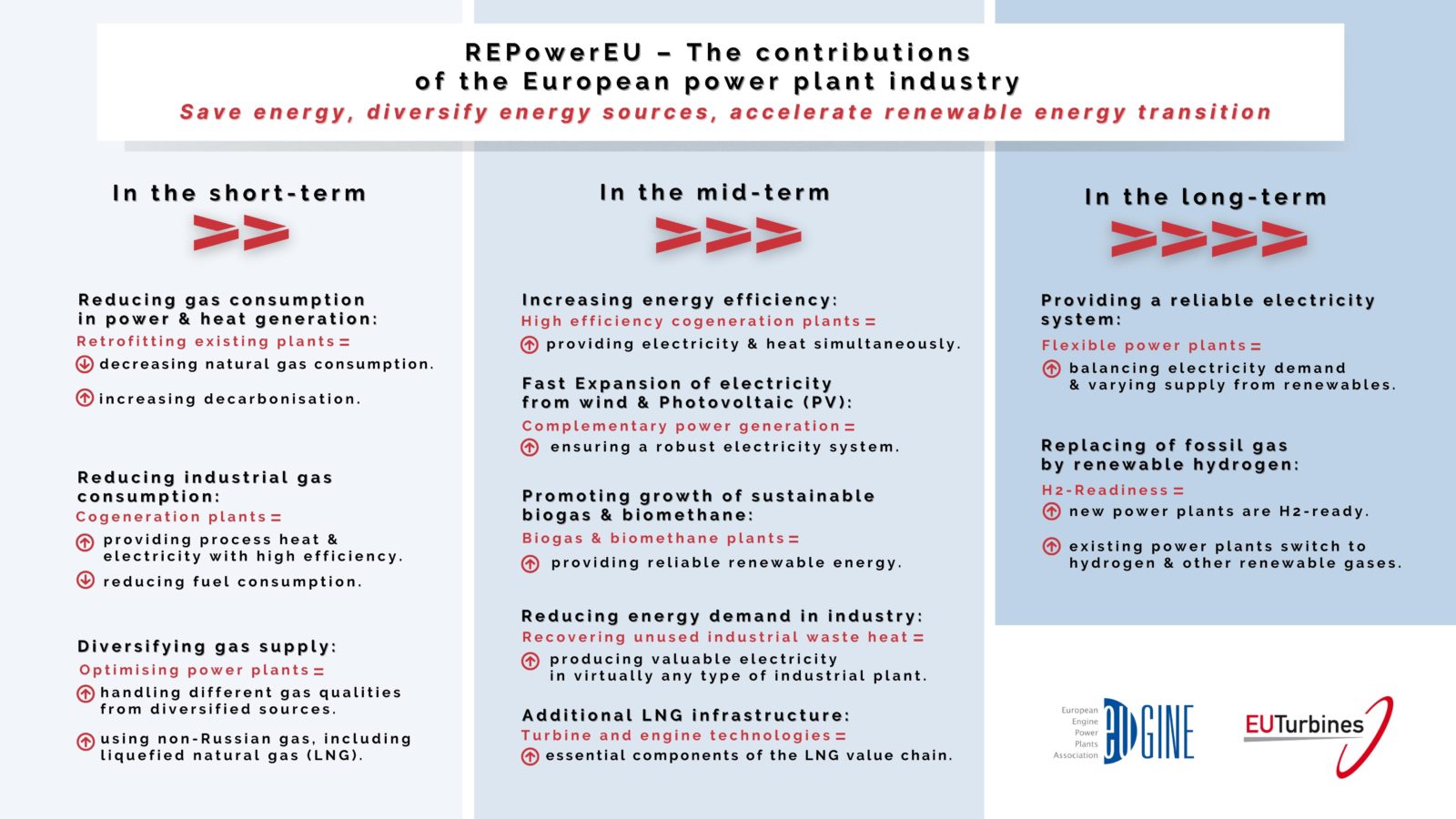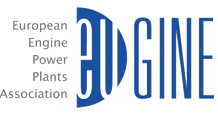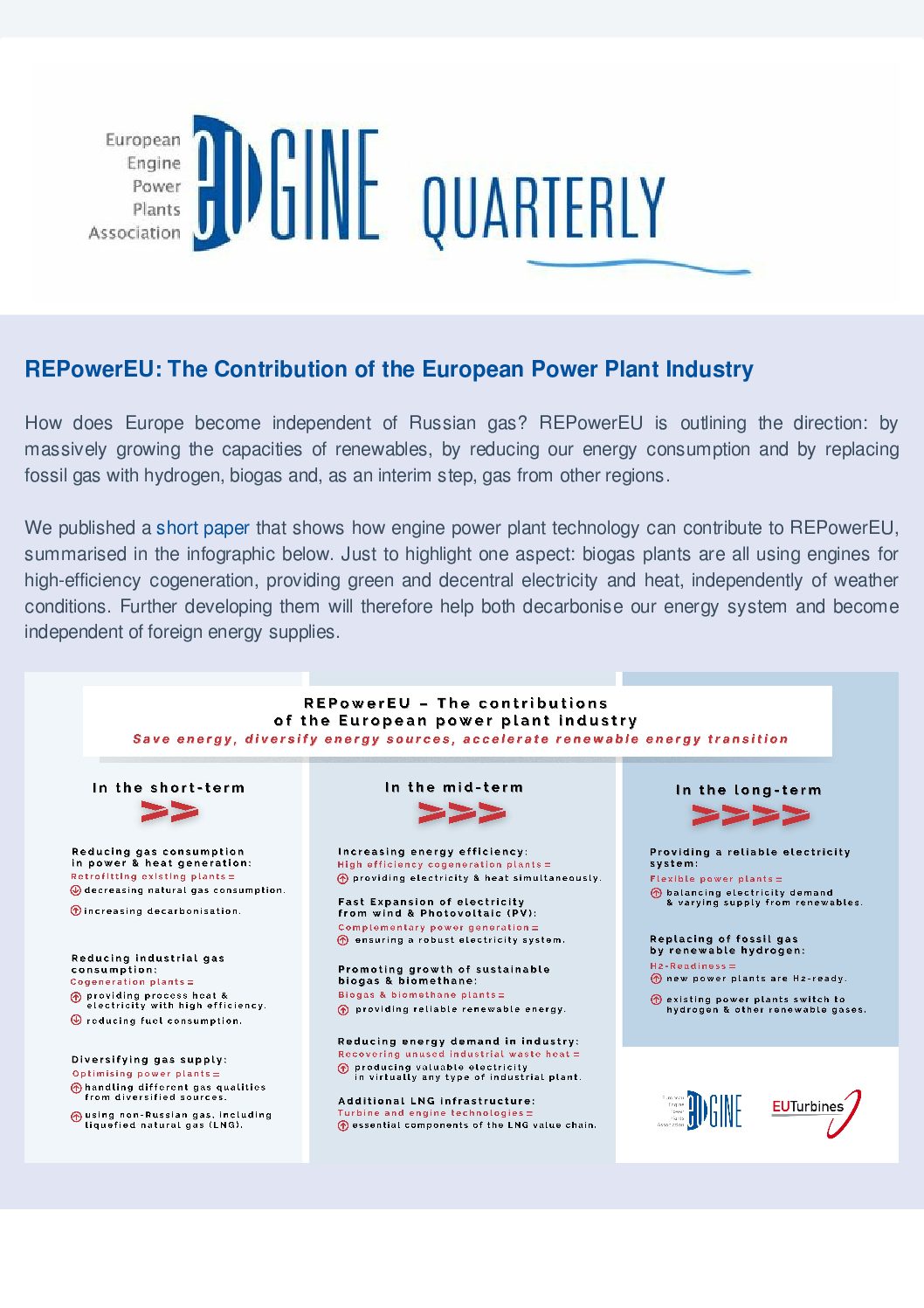EUGINE Quarterly Newsletter
12 July 2022
REPowerEU: The Contribution of the European Power Plant Industry
How does Europe become independent from Russian gas? REPowerEU is outlining the direction: by massively growing the capacities of renewables, by reducing our energy consumption and by replacing fossil gas with hydrogen, biogas and, as an interim step, gas from other regions.
We published a short paper that summarizes how engine power plant technology can contribute to REPowerEU, summarized in the infographic below. Just to highlight one aspect: Biogas plants are all using engines for high-efficiency cogeneration, providing green and decentral electricity and heat independent from weather conditions. Further developing them will therefore help both decarbonise our energy system and become independent of foreign energy supplies.

Gas Market Package: Power Plants Should not be Overlooked
Since the European Commission published its proposals to decarbonise gas markets in December 2021, Russia has gone from being Europe’s major gas supplier to becoming its main foe and our continent is preparing for a major energy crisis. But this situation has only made gas market decarbonisation more – and not less – relevant.
In a decarbonised energy system, power plants running on hydrogen and other renewable gases will provide essential system services by integrating electricity, gas and heat systems and by balancing energy supply and demand. To accelerate the transition, this potential needs to be better considered in the Gas Market Package. Read more.
Back on the Agenda: Electricity Market Design
Only three years ago, the EU institutions agreed on a revised European electricity market design. Now, high energy prices have brought the topic back on the agenda: in the last months, the European Commission has published communications on energy prices and on market design. Recently, Ursula Von der Leyen declared that the “market system does not work anymore” and needs to be reformed.
The difficult short-term situation – ie excessively high retail energy prices caused by the current geopolitical situation – should however not lead us to the wrong conclusions in the long term. As shown by ACER, the current electricity market design is worth keeping, although some improvements might be needed to adapt markets to high shares of wind and solar and the linked flexibility needs.
In the coming months, our association will launch a reflection on how to make our low-carbon backup capacities for renewables become attractive. If you want to know more or contribute to it, get in touch!
European Parliament Upholds Taxonomy Proposal: Vote does not mean support for Russian gas
On the 6th of July, a majority of MEPs voted to support the Commission proposal to include gas power and heat generation in the EU Taxonomy. With this vote, the Parliament recognized the need for dispatchable power and heat generation complementing renewables and able to switch to climate-neutral gases as these become available.
The outcome of the vote created large discontent in some political groups and civil society, who interpreted the vote as support to Russia. Nothing could be further from the truth: the Taxonomy Delegated Act does neither say that natural gas is sustainable, nor is it a signal of support for Russia. Rather, it requires gas power plants to fulfill the same emission requirements as other power and heat generation technologies, with a limited transition pathway until 2030 under strict conditionalities.
Read our reaction and why this Delegated Act is needed.
EUGINE has a new website!
We are proud to announce that our new website is now online. It features both the content from the previous website and some novelties, such as the “H2-Readiness in Action” page, were you will find the latest news relating to hydrogen-ready power plants. The new website should also make it easier to find our policy positions, press releases and other publications, which are now listed under 4 main priorities: Dispatchable Electricity and Heat, Hydrogen and Renewable Gases, Trade and Industry and Sustainability.
We hope you enjoy it and look forward to your feedback!


